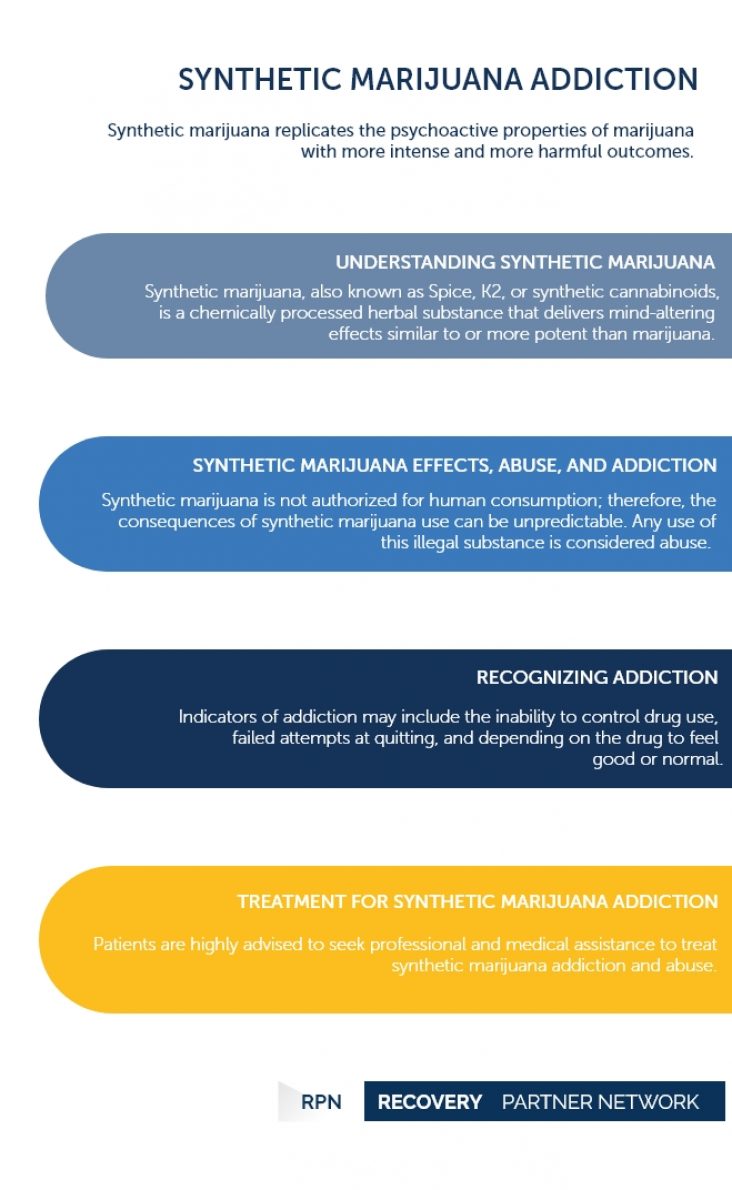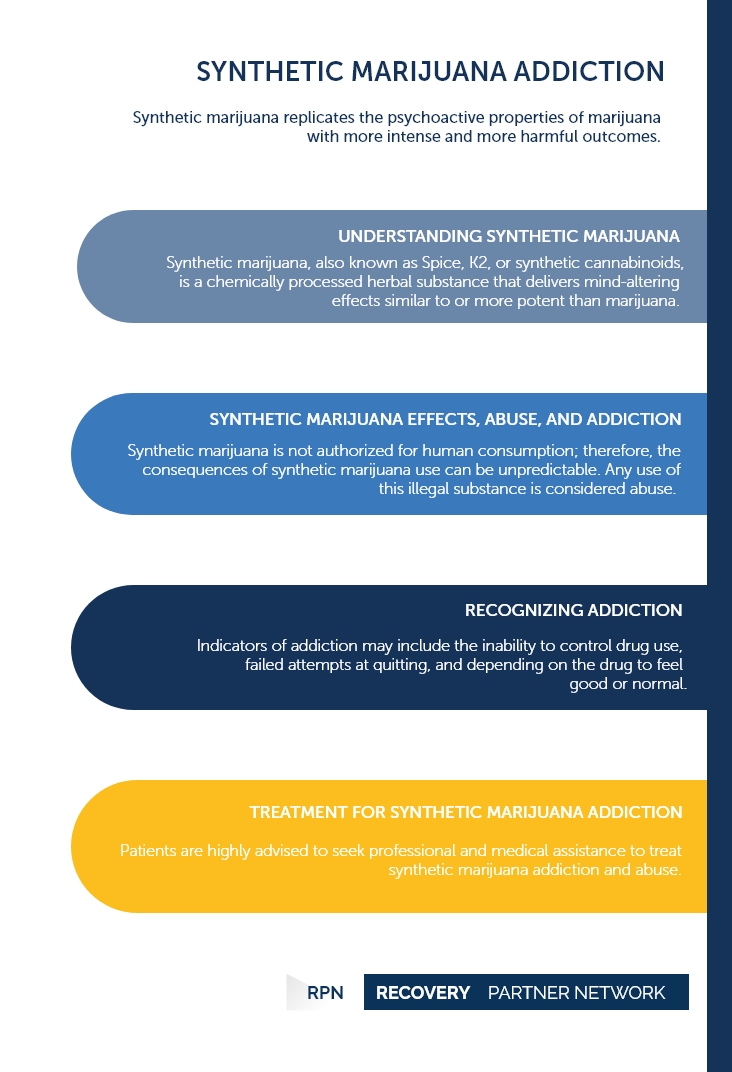Synthetic marijuana replicates the psychoactive properties of marijuana with more intense and more harmful outcomes.
Synthetic Marijuana Addiction
Illicit drugs
- Ayahuasca addiction – Abuse
- Baclofen addiction
- Black tar heroin addiction
- Cannabis addiction
- Cocaine dependence
- Crack cocaine addiction
- DMT addiction abuse treatment
- Does Marijuana Kill Brain Cells?
- Ecstasy addiction
- Gabapentin addiction
- gamma-Hydroxybutyric acid addiction
- Hallucinogen
- Heroin addiction
- Illicit drug addiction
- Inhalant addiction
- Cocaine
- Ketamine addiction
- Lysergic acid diethylamide addiction
- Mescaline addiction
- Methamphetamine addiction
- Meth Labs: Cooking up Addiction
- Meth Mouth
- Microdosing
- Phencyclidine addiction
- Psilocybin mushroom addiction
- Sage of the diviners – Addiction
- Shooting Heroin
- Shooting Methamphetamine
- Smoking Cannabis
- Speedball
- Synthetic cannabinoids
Synthetic cannabinoids | Table of Contents
Understanding Synthetic Marijuana
Synthetic marijuana, also known as Spice, K2, or synthetic cannabinoids, is a chemically processed herbal substance that delivers mind-altering effects similar to or more potent than marijuana. Chemicals in synthetic marijuana are similar to tetrahydrocannabinol (THC), which is a psychoactive ingredient in marijuana. Spice is most often smoked, but it can also be mixed in beverages or edibles.
Apart from Spice and K2, the other names for synthetic marijuana are:
- Mojo
- Black mamba
- Genie
- Cloud 9
- Yucatan Fire
- Moon Rocks
- Skunk
- Zohai
- Bliss
- Blaze
- Fake weed
FAQ
- What is synthetic marijuana?
- Is synthetic marijuana an illegal drug?
- Can synthetic marijuana be fatal?
Synthetic cannabinoids or marijuana are substances that are sold over the counter or internet as herbal incense products. The effects of this substance are similar to that of psychoactive chemicals found in natural marijuana.
Synthetic marijuana is illegal to possess.
Yes, there have been reports of fatalities caused by synthetic marijuana use.
Synthetic Marijuana Effects, Abuse, and Addiction
The effects of synthetic marijuana are identical to those of marijuana, including a modified perception of reality and relaxed-euphoria. The precise ingredients in synthetic marijuana may vary in each batch as the chemicals used in the production of this substance could be anything from fertilizers to cancer treatment medications. As most chemicals used are not authorized or verified for human consumption, the adverse consequences of synthetic marijuana use can be unpredictable.
The minor side effects of synthetic marijuana are similar to that of actual marijuana. However, severe side effects of synthetic marijuana could lead to fatal consequences, unlike natural marijuana.
A few of the side effects of synthetic marijuana are:
- High blood pressure
- Anxiety
- Nausea
- Vomiting
- Paranoia
- Seizures
- Rapid heartbeat
- Profuse sweating
- Confusion
- Hallucinations
- Heart attacks
- Kidney damage
Since synthetic marijuana is not originally designed to be smoked or ingested, the use of synthetic marijuana in any form is considered abuse. Many adolescents and young adults are drawn to this substance due to false presumptions of its safety or its legal status. Many individuals find the consumption of synthetic marijuana far more appealing than most other drugs, as this substance is generally not detected through most drug tests.
“Synthetic marijuana use] is not an epidemic. But it’s a growing problem. And people need to be thinking about it, and how we’re going to deal with it.”
– Rear Admiral Peter Delany, SAMHSA’s Center for Behavioral Health Statistics and quality director.
FAQ
- What are the risks associated with the use of synthetic marijuana?
- How harmful is synthetic marijuana?
- Is microdosing on synthetic marijuana safe?
Side effects of synthetic marijuana may include nausea, anxiety, paranoia, brain swelling, seizures, aggression, hallucinations, heart palpitations, and chest pain.
Synthetic cannabinoids are highly dangerous and unpredictable substances that affect the brain substantially more than marijuana and process a high risk of causing life-threatening complications.
There is no safe dose for synthetic marijuana.
Recognizing Addiction
Frequent abuse of synthetic marijuana can lead to psychological and physical dependence. Other factors, such as a history of psychiatric disorders or drug use, can also significantly increase the likelihood of addiction.
Other indicators of synthetic marijuana addiction may include:
- The inability to control synthetic marijuana use.
- Several failed attempts at quitting drug use.
- Neglecting family and friends to consume drugs.
- Continuing to use drugs even though it causes adverse consequences.
- Depending on the drug to feel good.
The Safety and Legal Status of Synthetic Marijuana
While the DEA has tried to control the production and distribution of synthetic marijuana, its greatest challenge has been to keep ahead of the legal status of the ingredients used during production. Synthetic marijuana manufacturers have been able to continue legally marketing their products in the US by modifying the chemical structure as soon as one is deemed illegal.
As per the Drug Enforcement Administration (DEA,) most of the chemicals used in synthetic marijuana are produced in Asia without any guidelines or standards. They are then trafficked to the US, where they are sprinkled on plant material and packaged. Some of these chemicals are legal, although more and more illegal compounds have also been found in synthetic marijuana. In 2015, the DEA rated 15 variants of synthetic marijuana as Schedule I substances, which puts them under the same category of drugs, such as crack cocaine and heroin. The Food and Drug Administration (FDA) also noted that more than 75 other compounds that have not been properly regulated had been identified in the drug. These chemicals have varying safety levels and are not recommended for consumption.
Sold at gas stations, head shops, and on the Internet, this drug is endorsed as a safe and legal alternative to marijuana, despite strong evidence to the contrary. Synthetic marijuana is advertised as incense or potpourri and is labeled as “not for human consumption.” This marketing strategy enables the substance to be sold legally.
Synthetic Marijuana Statistics
- Synthetic marijuana is regarded as the second most widely abused illegal substance (after marijuana) by high school students.
- In 2010, around 11,406 emergency room visits were associated with the use of synthetic marijuana.
- Nearly 75 percent of these ER visits were made by young individuals between the age of 12-29 years.
Synthetic Marijuana Withdrawal
Prolonged consumption of synthetic marijuana can cause the formation of physical and psychological dependence. Individuals who cease consumption during this stage will experience severe withdrawal symptoms. As the chemical structure of each synthetic marijuana varies, so does the withdrawal symptoms. Symptoms of synthetic marijuana withdrawal can vary from mild to serious, based on the duration of abuse and the severity of the addiction.
Withdrawal symptoms may include:
- Severe anxiety
- Depression
- Headache
- Irritability
- Anger
- Reduced appetite
- Intense cravings
- Diarrhea
Treatment for Synthetic Marijuana Addiction
As with any potent substance, it is highly possible to form an addiction to synthetic marijuana. Studies have also shown that even individuals with unpleasant experiences with this drug tend to form a dependence and addiction to it.
Therapeutic interventions and drugs are yet to be specified for the treatment of synthetic marijuana abuse. However, patients are highly advised to seek professional and medical assistance for the treatment of synthetic marijuana addiction and abuse.
The initial stage of all addiction treatment involves the process of detoxification, followed by inpatient or outpatient treatment programs. Patients who suffer from co-occurring disorders and severe addiction are better suited for inpatient treatment programs. After the successful completion of such programs, patients must seek further treatment through ongoing aftercare programs to prolong their recovery.
Recovery Partner Network
We aim to educate and empower. If you feel our library of resources does not cover your specific need, reach out to us, and we would be happy to help.
STATISTICS
© Copyright 2025


